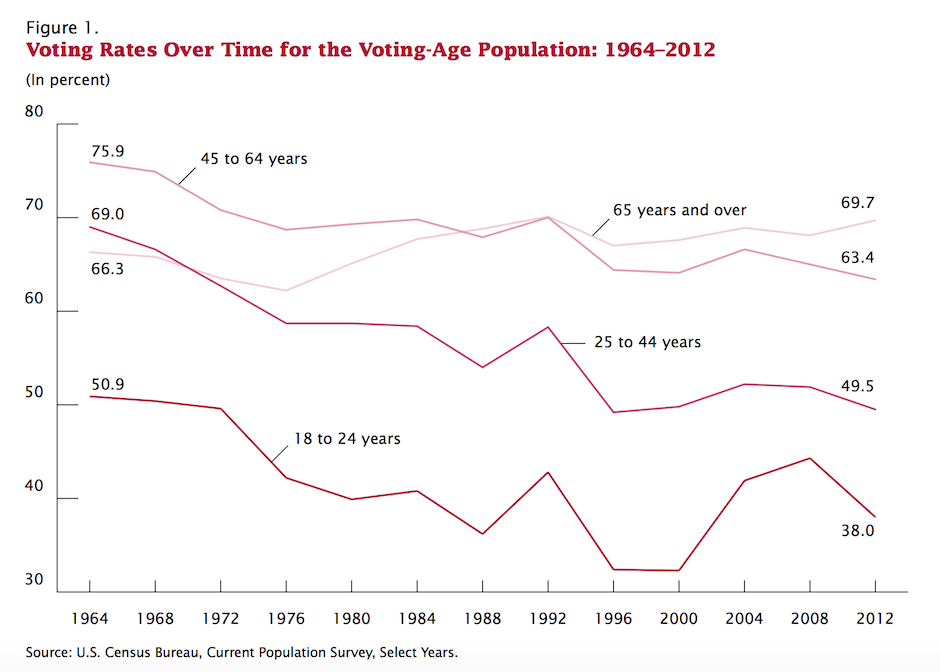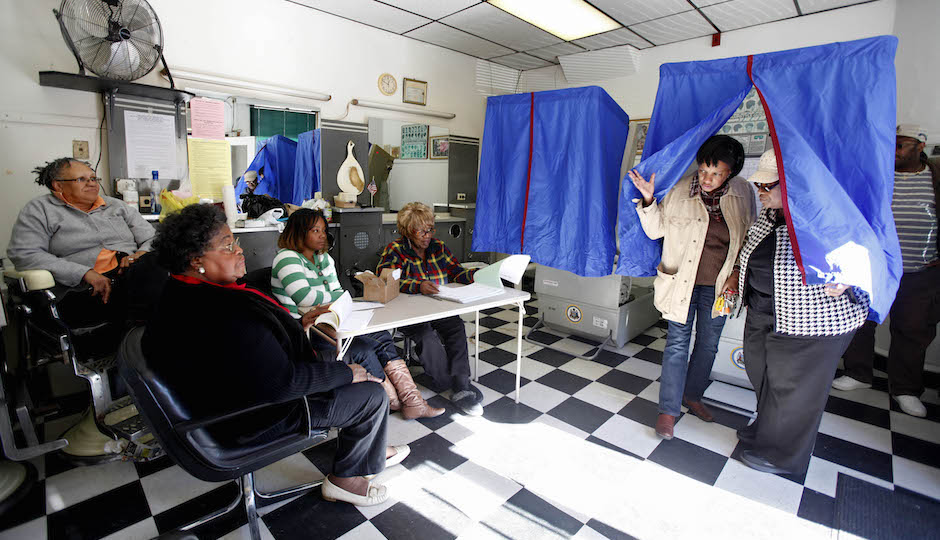Millennials Don’t Vote for the Same Reason Your Generation Didn’t
A lot of people are really, really worried about the fact that millennials don’t vote in mayoral elections.
But maybe they shouldn’t be.
Don’t get me wrong, it sucks. Only 12 percent of registered voters between the ages of 18 and 34 cast a ballot in Philadelphia’s recent mayoral race. That’s the worst turnout of any age group in the city.
As a 29-year-old whose third-favorite holiday is Election Day, I’d love it if that changed. Millennials are actually the largest voting bloc in the city, which means that we could theoretically wield more clout in local elections than Gen Xers, Baby Boomers and our grandparents. Forget pensions, here come more bike lanes! (I kid, I kid.)
But we’re probably not going to pack the polls at the same rate as our parents anytime soon. While that’s not ideal, it’s not the end of the world, either. Because I think our voting habits will get better with time.
Take a look at this graphic:

Graphic by the U.S. Census Bureau
This tracks the turnout rate in presidential elections among different age groups since the 1960s. As you can see, since at least 1964, 18- to 24-year-olds have voted at lower rates than 25- to 44-year-olds, 45- to 64-year-olds, and those 65 years and older. And since the mid-’90s, each successive age group has voted at a higher rate than the one younger than it.
Now, it’s true that the voter turnout rate among 18- to 24-year-olds has fallen since 1964, by a total of 12.9 percentage points. But that’s actually smaller than the decline in the turnout rate among 25- to 44-year-olds (19.5 percentage points), and it’s roughly equal to the drop among 45- to 64-year-olds (12.5 percentage points).
In fact, millennials voted at higher or comparable rates in the 2004, 2008 and 2012 elections than their parents did when they were youngsters in the 1970s and 1980s. Take that, Mom!
Unfortunately, Philadelphia does not have reliable data on voter turnout among different age groups in any competitive mayoral races except for 2015, according to City Commissioner Al Schmidt‘s office. So we don’t know if young people voted at lower rates than older people in the mayoral contests of the 1970s, ’80s and ’90s. But we do know that in this year’s election, each successive age group voted at a higher rate than the one younger than it, just like in every presidential race over the last two decades.
And if you chop up the data on Philadelphia’s mayoral race, you can see that older millennials vote at a higher rate than younger millennials: 14 percent of 25- to 34-year-olds came to the polls on May 19th, compared to 11 percent of 18- to 24-year-olds.
I don’t say any of this to depress voting or discourage anyone from casting a ballot. Again, I’m all about millennials having a stronger voice in city government.
Instead, I say it to first make the point that millennials aren’t staying away from the polls because we’re lazy vampires who are going to suck the life out of democracy itself, but rather because we’re much like the generation before us and the generation before it. No one votes when they’re young, and perhaps that’s because as we get older, the government impacts our lives in more obvious ways. We have kids and send them to public schools; we buy homes and have to pay local property taxes.
And secondly, I think a lot of time is being wasted by smart people who are trying to figure out why millennials don’t vote in local elections. A Knight Foundation study recently took a crack at this question, and came up with some pretty unsatisfying answers.
The more important question, I think, is why voter turnout is down overall in Philadelphia’s mayoral elections. The 1971 contest boasted a 77 percent turnout rate among all registered voters; in 2015, a measly 27 percent of voters came to the polls. Let’s figure out why that’s happening first (kudos to CityLab’s Daniel Denvir for tossing out a couple clever potential answers already), and come up with solutions to fix it.
Because worry not, the kids will catch up.
